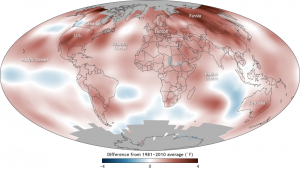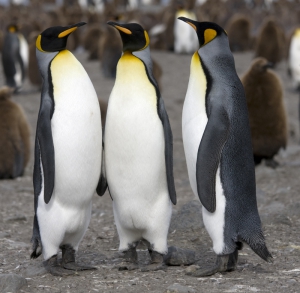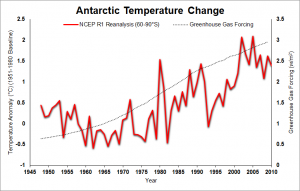“Climate-driven range shifts of the king penguin in a fragmented ecosystem”: a summary of the effects of anthropogenic climate change on habitat fragmentation through genomic analysis in the king penguin community
By Julia Saltzman, SRC intern
Climate change is a hot topic today, not only in the world of science, but also in the world of politics and policy (Figure 1). Despite this fact, it has not been until recently that scientists have started to study the impacts of climate change on specific species. Because anthropogenic climate change is known to have important consequence across biologic communities, having and understanding of the nature and extent of species’ responses is crucial in modeling policy for effective environmental change (Cristofori Et. Al., 245). In the article, Climate-driven range shifts of the king penguin in a fragmented ecosystem, research is discussed which focuses on the upper-level predator, the king penguin, in one of the most rapidly changing ecosystems on the planet: the sub-Ant-arctic region.

Figure 1: global surface temperature in 2017 compared to the 1981-2010 average. High latitudes of the Northern Hemisphere were especially warm, though temperatures across most of the planet were warmer than average (red colors). (Source: NOAA Climate.gov map, based on data from NOAA NCEI.)
The king penguin exhibits high levels of dispersal, and fragmented distribution. It has been suggested that the remarkably high migration rate among colonies can explain this. In order to test this hypothesis, researchers produced a genome-wide data set (Cristofori Et. Al., 246). including about 35,000 independent polymorphic loci genotyped in 163 individuals from 13 different locations covering most of the king penguin (Figure 2). Following the data collection, it was verified that the long-term relationship between paleohabitat reconstruction and the species’ past demography can be inferred from genomic data. Based upon this paleogenetic reconstruction, which allowed or analysis of location specific genomes, found that heterogeneous environmental changes lead to uncoupled effects on different crucial areas of the king penguins’ habitat.

Figure 2: the king penguin, Aptenodytes patagonicus, at first glance appears to be very similar to the emperor penguin, however, it is smaller and completely different genetically. (Source: Wikipedia commons).
Although this data gives highly complex insight into the genomic of the king penguin community across boundaries of fragmentation, it can tell scientists and policy makers really good information about the near-future scenarios which can project changes in these penguins’ range and population size. Although some scientists may suggest that the species can evolve overtime to adapt to anthropogenic climate change (figure 3), species fragmentation, and changes in resource partitioning, past data has found that due to the king penguins’ low genetic diversity and long generation time, the species is not expected to undergo any rapid adaptive evolution to new conditions in its range. Because species fragmentation and climate change go hand in hand, not only in the king penguins’ population, but in the overall ecosystem of the earth, this data collection methodology and results can give insight into the effect of habitat fragmentation on species’ niche and genetic diversity. This data can be used collaboratively to help mitigate the effect of anthropogenic fragmentation which happens so frequently in a plethora of ecological niches.

Figure 3: From a study of detailed analysis of a recently published Antarctic temperature reconstruction, which combined satellite and ground information using a regularized expectation–maximization algorithm (O’Donnell et al. 2009).
Works Cited:
O’Donnell, R., Lewis, N., Mcintyre, S., & Condon, J. (2011). Improved methods for PCA-based reconstructions: Case study using the Steig et al. (2009) antarctic temperature reconstruction. Journal of Climate. doi:10.1175/2010JCLI3656.1
Climate Change: Global Temperature | NOAA Climate.gov, 1 Aug. 2018, www.climate.gov/news-features/understanding-climate/climate-change-global-temperature
Weintraub, Karen. “Largest King Penguin Colony in the World Drops by 90%.” The New York Times, The New York Times, 31 July 2018, www.nytimes.com/2018/07/31/science/king-penguin-decline-antarctica.html.
Cristofari, R., Liu, X., Bonadonna, F., Cherel, Y., Pistorius, P., Le Maho, Y., … Trucchi, E. (2018). Climate-driven range shifts of the king penguin in a fragmented ecosystem. Nature Climate Change. doi:10.1038/s41558-018-0084-2
